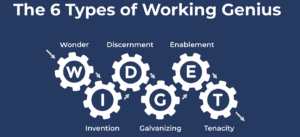“You can’t be a pastor! That would make me a pastor’s wife! And I am NOT a pastor’s wife.” These were the very first words I said to my husband after he confessed to me that he felt God was calling him to be a pastor. (Encouraging, I know… Bear with me.) Some women attend seminary and meet their future husband while he is studying for a career in ministry. She’s prepared to be known as the “pastor’s wife” for their marriage. That is not what happened to me. I was completely unprepared to be a pastor’s wife– my husband was in logistics at a warehouse. I never imagined God would call him to be a pastor and I would be a “PW”– I didn’t even know what PW meant!
Thankfully, God brought me around and I joyfully accepted this new role. I looked at it as a big, new adventure we would go on together. My husband and I, in ministry, doing the Lord’s work. Proclaiming the Gospel to hurting and broken people, together! What could be better than that?
If you’re reading this and thinking, “Oh man… She might be in for a shock.” You’re right. I was!
After 16 years in ministry, I can honestly say it has been a big adventure– one that has included many wonderful, joyful mountains, but one that also included several painful and dark valleys. Most of those valleys have happened in the season of replanting/revitalization in our church. In those valleys, it’s easy to feel isolated and alone in ministry. Looking at other churches, I would think, “They have it all figured out. They don’t seem to struggle the way we’re struggling! Maybe we just aren’t called to this.” Perhaps you have felt that way, too. If you’re a pastor reading this, I can almost guarantee your wife has felt that!
On a recent episode of the Replant Bootcamp podcast, host Jimbo Stewart spoke with three replant wives (one of whom is probably his favorite guest of all time) to take a look at the resources available to the wives working alongside their husbands in church renewal.
The Replant Wife Experts

During those moments of isolation and loneliness, sometimes all we need is a small reminder that we aren’t alone. This is where I found myself at the first Replant Summit I attended with my husband. We had navigated some very discouraging and hard times in our church and we signed up hoping to be refreshed and renewed. I was burdened with many needs, some spiritual and some within our own family. When I saw a breakout session for “Replant Wives,” I thought, “Nope.” The last thing I wanted to hear was how amazing life was for all those wives and how wonderful their churches were.
My husband convinced me to go, and I entered that room overwhelmed and anxious. I sat at an empty table prepared to sit quietly and speak to no one. But before I could enact that plan, other women came to sit at the table. These women were all so friendly and kind, and I found myself sharing some of my concerns with them briefly before the session even started. They seemed to understand everything I had experienced. They seemed like they “got it,” in a way that my other friends didn’t. Those women were Audrea Stewart, Darlene Dryer, and Barb Bickford, the hosts of the breakout session and the spouses of Jimbo Stewart, Josh Dryer, and Bob Bickford, respectively. Turns out, I hadn’t sat down at an empty table– I was at “their” table! (I had somehow missed the purses, laptop bags, and materials they had around the table.)
For the next couple of hours, I sat with many other women in the room as these three incredible women poured into us with biblical, practical advice for this journey. They each shared their stories, complete with heartaches and struggles. They were transparent and relatable, but also gently and wisely continued to point us each back to Christ and His leadership. As we each began to open up with our own worries and anxieties, I realized I had been wrong. I wasn’t alone or isolated. There were so many women struggling with the same issues I was– and these three “expert Replant Wives” had struggled with them, too!
I know these three women would object to being called “experts”– they are just wives who are doing their best to assist their husbands in this work of church renewal. But that day, Audrea, Darlene, and Barb gave us more than the resources of books to read, biblical passages to study, and tangible tools for problem-solving– they gave us the resource of friendship. We were able to connect with each other, as women all over the room began to bond over shared trials, joys, and everything in between. The connections I formed that day reminded me that I wasn’t alone. The resource of friendship was something that I will never forget.
The Replant Wife Facebook Page- a Source of Connection
After the Summit, I went home and immediately joined the Replant Wife Facebook Group. There, I get to interact with Audrea, Darlene, and Barb, but I have also met Replant Wives from the Midwest, the Pacific Coast, and the Northeast United States. It is a closed group, so wives can be transparent without worrying about breaking confidentiality. They can share their burdens and know that someone out there understands what they are going through. They can share helpful articles and books they’ve read, but they also share prayer requests and biblical questions. It’s a forum for pastor’s wives in church renewal, so there are even helpful tools for struggling congregations.
Some of the questions that are asked and answered are practical– “Has anyone done VBS on a budget? What tools were helpful?” “Has anyone been involved in rewriting bylaws? What did you run into that you didn’t expect?” “What is a great meal for unexpected company or for feeding a large crowd?” These questions are answered by other women in the context of church renewal– churches with normative attendance, budgets, and resources. Churches a lot like yours.
This online connection fosters a community. Now, when I go to a replant conference with my husband, I can connect with the women I know from the Facebook page and get updates on their lives and ministries. We look forward to seeing each other and catching up. Our community has borne each others burdens and celebrated each others successes. We are truly in it together.
The Replant Wife Website, Blog, and Podcast

Another important resource for Replant Wives is the website, which also houses the blog. Audrea, Darlene, and Barb have all penned blog posts regarding common issues in this renewal life. Audrea wrote on navigating the post-holiday blues, Barb has written a series on longevitiy in ministry, and Darlene is writing about finding joy in trials. Think of this website as the “landing page” for all things Replant Wife. In addition to Audrea, Darlene, and Barb, there are also resources from Kathy Addis (wife of Andy Addis), Jeanette Pugh (wife of Colin Pugh), and Joyce Jackson (wife of David Jackson), each of whom bring their own stories of ministry mountains and valleys.
In addition to the incredible resources the three women have cultivated, they also have links to NAMB’s replanting resources. NAMB is consistently looking for ways to support and care for pastors in ministry and one of those focuses has to be the pastor’s family. In a replant/revitalization, where there are potentials for seasons of change and conflict, this is even more important. A pastor does not weather the conflict alone– his family will feel it, too. His wife will need support and encouragement, and she can find it within those resources.
But I think the best resource the women leading this effort have cultivated is their podcast. This podcast seeks to be a refuge for the replant wife to be equipped and encouraged for the work God has called her to do. Listening to it, you feel like you’re sitting around with three friends discussing Jesus, the bible, ministry, and families. There, the three women discuss their blogs and talk about important topics in church renewal. They take the time to really dive into scripture and give biblical, practical advice. They remind the listener that she is not alone in this work. But they also remind her that this work is God’s glorious calling.
For every replant pastor, there is a replant wife who needs to know she is not alone. We are here for you and we want to hear from you! The Lord has called us to bring dying churches back to life– that’s an amazing honor!
If you want to meet these amazing women in person, you can do so at the Am I a Replanter conference at Southeastern Baptist Theological Seminary April 5-6 or at New Orleans Baptist Theological Seminary April 12-13. (And, yeah, their husbands will be there, too.)



 Another great insight shared in this podcast was raising your kids to be good kids but not raising them to be a “pastor’s kid.” What do we mean? Children in ministry must not be raised with the impossible expectation of being a perfect, rule-following child as an example for other kids. In other words, we must not expect them to be ideal role models for the rest of the kids. Sometimes, we put high religious expectations on our kids, and they fear imperfection and feel the weight of pressure that no child should bear.
Another great insight shared in this podcast was raising your kids to be good kids but not raising them to be a “pastor’s kid.” What do we mean? Children in ministry must not be raised with the impossible expectation of being a perfect, rule-following child as an example for other kids. In other words, we must not expect them to be ideal role models for the rest of the kids. Sometimes, we put high religious expectations on our kids, and they fear imperfection and feel the weight of pressure that no child should bear. 

 On the other side, we must not shy away from all discussion and ignore the issues surrounding us. Faithful preaching will simply preach the word, but make application of the word to the congregation. If your church is a voting poll, or a gathering place during the week for city meetings, utilize your people and place to show the love of Christ to the community. For example, this can be done by handing out snacks and water bottles, and praying over people as they walk out. We must lead by example, helping our people see the need of living on Mission for Jesus Christ.
On the other side, we must not shy away from all discussion and ignore the issues surrounding us. Faithful preaching will simply preach the word, but make application of the word to the congregation. If your church is a voting poll, or a gathering place during the week for city meetings, utilize your people and place to show the love of Christ to the community. For example, this can be done by handing out snacks and water bottles, and praying over people as they walk out. We must lead by example, helping our people see the need of living on Mission for Jesus Christ.






